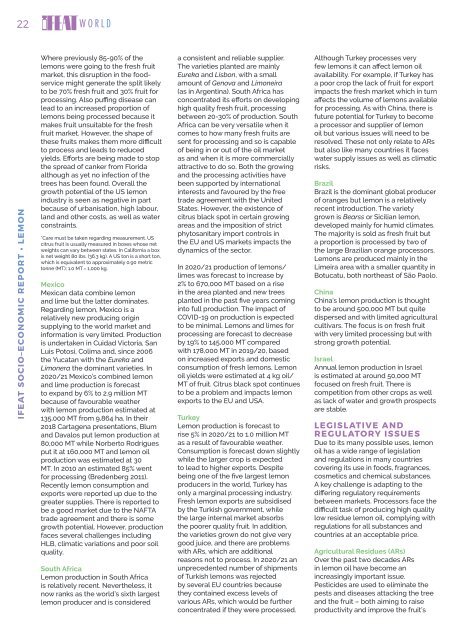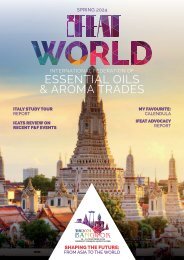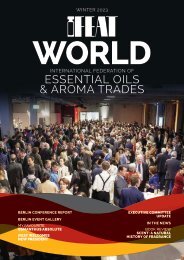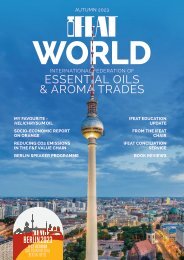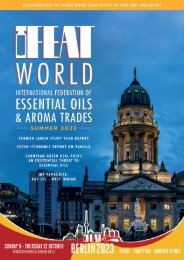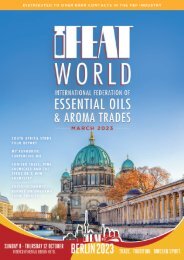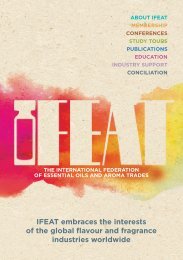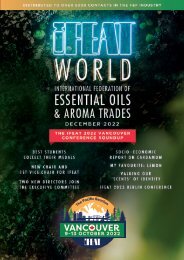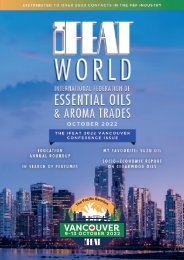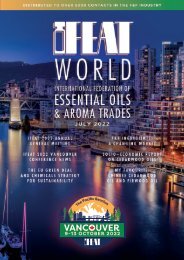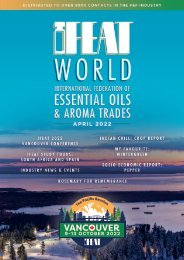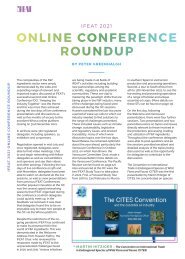IFEATWORLD September 2021
IFEATWORLD is an aroma trades publication for members of IFEAT - The International Federation of Essential Oils & Aroma Trades
IFEATWORLD is an aroma trades publication for members of IFEAT - The International Federation of Essential Oils & Aroma Trades
- No tags were found...
You also want an ePaper? Increase the reach of your titles
YUMPU automatically turns print PDFs into web optimized ePapers that Google loves.
22<br />
WORLD<br />
IFEAT SOCIO–ECONOMIC REPORT • LEMON<br />
Where previously 85-90% of the<br />
lemons were going to the fresh fruit<br />
market, this disruption in the foodservice<br />
might generate the split likely<br />
to be 70% fresh fruit and 30% fruit for<br />
processing. Also puffing disease can<br />
lead to an increased proportion of<br />
lemons being processed because it<br />
makes fruit unsuitable for the fresh<br />
fruit market. However, the shape of<br />
these fruits makes them more difficult<br />
to process and leads to reduced<br />
yields. Efforts are being made to stop<br />
the spread of canker from Florida<br />
although as yet no infection of the<br />
trees has been found. Overall the<br />
growth potential of the US lemon<br />
industry is seen as negative in part<br />
because of urbanisation, high labour,<br />
land and other costs, as well as water<br />
constraints.<br />
*Care must be taken regarding measurement. US<br />
citrus fruit is usually measured in boxes whose net<br />
weights can vary between states. In California a box<br />
is net weight 80 lbs. (36.3 kg). A US ton is a short ton,<br />
which is equivalent to approximately 0.90 metric<br />
tonne (MT); 1.0 MT = 1,000 kg.<br />
Mexico<br />
Mexican data combine lemon<br />
and lime but the latter dominates.<br />
Regarding lemon, Mexico is a<br />
relatively new producing origin<br />
supplying to the world market and<br />
information is very limited. Production<br />
is undertaken in Cuidad Victoria, San<br />
Luis Potosi, Colima and, since 2006<br />
the Yucatan with the Eureka and<br />
Limonera the dominant varieties. In<br />
2020/21 Mexico’s combined lemon<br />
and lime production is forecast<br />
to expand by 6% to 2.9 million MT<br />
because of favourable weather<br />
with lemon production estimated at<br />
135,000 MT from 9,864 ha. In their<br />
2018 Cartagena presentations, Blum<br />
and Davalos put lemon production at<br />
80,000 MT while Norberto Rodrigues<br />
put it at 160,000 MT and lemon oil<br />
production was estimated at 30<br />
MT. In 2010 an estimated 85% went<br />
for processing (Bredenberg 2011).<br />
Recently lemon consumption and<br />
exports were reported up due to the<br />
greater supplies. There is reported to<br />
be a good market due to the NAFTA<br />
trade agreement and there is some<br />
growth potential. However, production<br />
faces several challenges including<br />
HLB, climatic variations and poor soil<br />
quality.<br />
South Africa<br />
Lemon production in South Africa<br />
is relatively recent. Nevertheless, it<br />
now ranks as the world’s sixth largest<br />
lemon producer and is considered<br />
a consistent and reliable supplier.<br />
The varieties planted are mainly<br />
Eureka and Lisbon, with a small<br />
amount of Genova and Limoneira<br />
(as in Argentina). South Africa has<br />
concentrated its efforts on developing<br />
high quality fresh fruit, processing<br />
between 20-30% of production. South<br />
Africa can be very versatile when it<br />
comes to how many fresh fruits are<br />
sent for processing and so is capable<br />
of being in or out of the oil market<br />
as and when it is more commercially<br />
attractive to do so. Both the growing<br />
and the processing activities have<br />
been supported by international<br />
interests and favoured by the free<br />
trade agreement with the United<br />
States. However, the existence of<br />
citrus black spot in certain growing<br />
areas and the imposition of strict<br />
phytosanitary import controls in<br />
the EU and US markets impacts the<br />
dynamics of the sector.<br />
In 2020/21 production of lemons/<br />
limes was forecast to increase by<br />
2% to 670,000 MT based on a rise<br />
in the area planted and new trees<br />
planted in the past five years coming<br />
into full production. The impact of<br />
COVID-19 on production is expected<br />
to be minimal. Lemons and limes for<br />
processing are forecast to decrease<br />
by 19% to 145,000 MT compared<br />
with 178,000 MT in 2019/20, based<br />
on increased exports and domestic<br />
consumption of fresh lemons. Lemon<br />
oil yields were estimated at 4 kg oil/<br />
MT of fruit. Citrus black spot continues<br />
to be a problem and impacts lemon<br />
exports to the EU and USA.<br />
Turkey<br />
Lemon production is forecast to<br />
rise 5% in 2020/21 to 1.0 million MT<br />
as a result of favourable weather.<br />
Consumption is forecast down slightly<br />
while the larger crop is expected<br />
to lead to higher exports. Despite<br />
being one of the five largest lemon<br />
producers in the world, Turkey has<br />
only a marginal processing industry.<br />
Fresh lemon exports are subsidised<br />
by the Turkish government, while<br />
the large internal market absorbs<br />
the poorer quality fruit. In addition,<br />
the varieties grown do not give very<br />
good juice, and there are problems<br />
with ARs, which are additional<br />
reasons not to process. In 2020/21 an<br />
unprecedented number of shipments<br />
of Turkish lemons was rejected<br />
by several EU countries because<br />
they contained excess levels of<br />
various ARs, which would be further<br />
concentrated if they were processed.<br />
Although Turkey processes very<br />
few lemons it can affect lemon oil<br />
availability. For example, if Turkey has<br />
a poor crop the lack of fruit for export<br />
impacts the fresh market which in turn<br />
affects the volume of lemons available<br />
for processing. As with China, there is<br />
future potential for Turkey to become<br />
a processor and supplier of lemon<br />
oil but various issues will need to be<br />
resolved. These not only relate to ARs<br />
but also like many countries it faces<br />
water supply issues as well as climatic<br />
risks.<br />
Brazil<br />
Brazil is the dominant global producer<br />
of oranges but lemon is a relatively<br />
recent introduction. The variety<br />
grown is Bearss or Sicilian lemon,<br />
developed mainly for humid climates.<br />
The majority is sold as fresh fruit but<br />
a proportion is processed by two of<br />
the large Brazilian orange processors.<br />
Lemons are produced mainly in the<br />
Limeira area with a smaller quantity in<br />
Botucatu, both northeast of São Paolo.<br />
China<br />
China’s lemon production is thought<br />
to be around 500,000 MT but quite<br />
dispersed and with limited agricultural<br />
cultivars. The focus is on fresh fruit<br />
with very limited processing but with<br />
strong growth potential.<br />
Israel<br />
Annual lemon production in Israel<br />
is estimated at around 50,000 MT<br />
focused on fresh fruit. There is<br />
competition from other crops as well<br />
as lack of water and growth prospects<br />
are stable.<br />
LEGISLATIVE AND<br />
REGULATORY ISSUES<br />
Due to its many possible uses, lemon<br />
oil has a wide range of legislation<br />
and regulations in many countries<br />
covering its use in foods, fragrances,<br />
cosmetics and chemical substances.<br />
A key challenge is adapting to the<br />
differing regulatory requirements<br />
between markets. Processors face the<br />
difficult task of producing high quality<br />
low residue lemon oil, complying with<br />
regulations for all substances and<br />
countries at an acceptable price.<br />
Agricultural Residues (ARs)<br />
Over the past two decades ARs<br />
in lemon oil have become an<br />
increasingly important issue.<br />
Pesticides are used to eliminate the<br />
pests and diseases attacking the tree<br />
and the fruit – both aiming to raise<br />
productivity and improve the fruit’s


